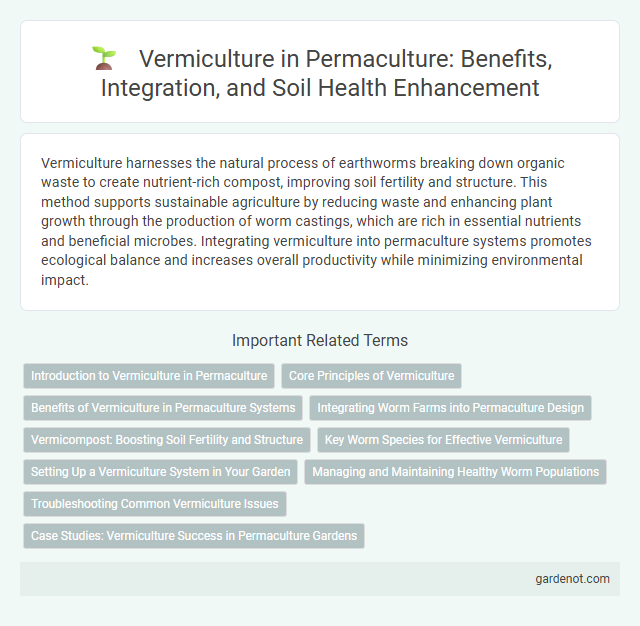Vermiculture harnesses the natural process of earthworms breaking down organic waste to create nutrient-rich compost, improving soil fertility and structure. This method supports sustainable agriculture by reducing waste and enhancing plant growth through the production of worm castings, which are rich in essential nutrients and beneficial microbes. Integrating vermiculture into permaculture systems promotes ecological balance and increases overall productivity while minimizing environmental impact.
Introduction to Vermiculture in Permaculture
Vermiculture in permaculture leverages earthworms to decompose organic waste into nutrient-rich vermicompost, enhancing soil fertility and structure naturally. This biological process supports sustainable food production by improving water retention and promoting beneficial microbial activity in permaculture systems. Integrating vermiculture encourages closed-loop nutrient cycles, reducing reliance on synthetic fertilizers while fostering ecosystem resilience.
Core Principles of Vermiculture
Vermiculture centers on cultivating earthworms to convert organic waste into nutrient-rich vermicompost, promoting soil health and fertility. Core principles include maintaining optimal moisture, temperature, and aeration for worm survival and efficiency, while providing a balanced diet of organic matter. Sustainable waste management and enhanced microbial activity are achieved by harnessing the natural decomposition process facilitated by worms.
Benefits of Vermiculture in Permaculture Systems
Vermiculture enhances permaculture systems by improving soil fertility through the natural breakdown of organic waste into nutrient-rich worm castings. This process increases microbial activity and enhances soil structure, promoting healthier plant growth and higher crop yields. Incorporating vermiculture reduces waste, supports sustainable nutrient cycling, and fosters resilient ecosystem dynamics within permaculture designs.
Integrating Worm Farms into Permaculture Design
Integrating worm farms into permaculture design enhances soil fertility by producing nutrient-rich vermicompost that boosts plant growth and ecosystem health. Worm farms recycle organic waste efficiently, reducing landfill dependency while enriching soil microbiomes critical for sustainable agriculture. This synergy promotes closed-loop nutrient cycling, water retention, and biodiversity, key principles in resilient permaculture systems.
Vermicompost: Boosting Soil Fertility and Structure
Vermicompost, created through the natural process of vermiculture, significantly enhances soil fertility by enriching it with essential nutrients and beneficial microbes. This organic compost improves soil structure, promoting aeration and water retention, which supports healthier plant growth. Utilizing vermicompost in permaculture systems leads to sustainable soil management and increased crop yields without relying on synthetic fertilizers.
Key Worm Species for Effective Vermiculture
Eisenia fetida, commonly known as red wigglers, are the most effective worm species for vermiculture due to their rapid reproduction and high composting efficiency. Lumbricus rubellus, another key species, excels in breaking down organic matter and enhancing soil aeration. Choosing the right worm species significantly improves nutrient-rich vermicompost production and supports sustainable permaculture practices.
Setting Up a Vermiculture System in Your Garden
Establishing a vermiculture system in your garden involves selecting a well-ventilated, moisture-retentive bin filled with bedding materials like shredded paper, coconut coir, or peat moss to create an ideal habitat for red wiggler worms (Eisenia fetida). Maintaining optimal conditions includes regulating temperature between 55-77degF (13-25degC), monitoring moisture levels around 70%, and providing a balanced diet of fruit and vegetable scraps, coffee grounds, and crushed eggshells to support worm activity and efficient organic waste degradation. Regularly harvesting nutrient-rich vermicompost enhances soil fertility, promotes microbial diversity, and improves plant growth within your permaculture system.
Managing and Maintaining Healthy Worm Populations
Maintaining healthy worm populations in vermiculture requires consistent monitoring of moisture levels between 70-90% and temperature ranges optimal for earthworms, typically 55-77degF (13-25degC). Providing balanced organic waste, such as fruit and vegetable scraps, ensures adequate nutrition while avoiding acidic or oily materials that can harm worm health. Regularly aerating the worm bin prevents anaerobic conditions, promotes microbial activity, and supports thriving vermiculture ecosystems.
Troubleshooting Common Vermiculture Issues
Vermiculture troubleshooting often addresses issues like foul odors caused by overfeeding or poor aeration, which can be resolved by adjusting the feed amount and turning the worm bin to improve airflow. Excess moisture leading to anaerobic conditions may be mitigated by adding dry bedding materials like shredded newspaper or cardboard to absorb excess water. Pest infestations such as fruit flies are commonly managed by burying food scraps deeper in the bedding and maintaining proper moisture balance in the worm habitat.
Case Studies: Vermiculture Success in Permaculture Gardens
Vermiculture has proven highly effective in permaculture gardens by enhancing soil fertility and accelerating organic matter decomposition. Case studies from diverse climates demonstrate increased crop yields and healthier plants due to the nutrient-rich worm castings produced by earthworms. These successes highlight vermiculture as a sustainable method for recycling organic waste and improving garden ecosystem resilience.
Vermiculture Infographic

 gardenot.com
gardenot.com